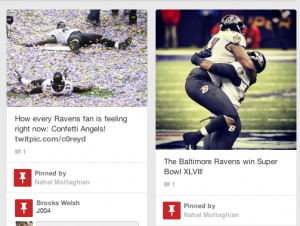You think that after the Super Bowl, sports news outlets fill their sites with photos of the game’s great plays? If that’s your guess, you’d only be half right.
Beyoncé Wins the Super Bowl
Only half of the photographs of Super Bowl XLVII published by major sports and news media pictured the “game” itself, according to SportPix, a new study from the International Center for Media & the Public Agenda (ICMPA) that I led with students at the Philip Merrill College of Journalism as researchers.
[Below: Beyoncé performs at Super Bowl XLVII]
Last year, Beyoncé received more photographic attention than any other single personality at the Super Bowl — more than the coaches, quarterbacks or other players — even though her performance lasted just 14 minutes. And photos of the post-game celebration, of fans and even just of the stadium accounted for the rest of that “other half” of the photo coverage — the half that wasn’t of the action on the field.
Winners Get More Tweets
This ICMPA study also found that news organizations are sharing few negative images from sporting events on social media platforms.
The study, which evaluated the photo coverage of both the 2013 Super Bowl and the NCAA Men’s Basketball Final, found that publications across the board were much more likely to tweet and Facebook photos of the winning Baltimore Ravens and Louisville Cardinals than photos of the losing 49ers and Michigan Wolverines.
And during the championship match-ups themselves, the study found that sports outlets were strategically sharing “positive” images of the game. ABC’s Wide World of Sports long-time lead-in balancing the “thrill of victory” against the “agony of defeat” hasn’t carried over to social media: the SportPix data affirms for sport news what previous studies have suggested about sharing trends for news — that there is a greater disposition to sharing positive stories or images on social media.
The findings are significant, highlighting that photos from sporting events, shared on websites and social media, are designed to do more than just report the news: They are a means to encourage readers to share images on social media and direct traffic back to news websites.
And that’s fine. If fan-based audiences are more likely to share positive images (of a winning Super Bowl team or a winning candidate), it makes sense why news outlets do the same… but editors should weigh those goals with their other clear role: Being fair reporters.
Pinterest a Stealth Tool for Sports Fans

Screenshot of the Ravens Super Bowl XLVII victory documented on the International Center for Media & the Public Agenda Pinterest page.
Together with ICMPA’s 2013 PrezPix study of the 2012 U.S. presidential election that evaluated almost 9,000 photographs, ICMPA’s SportPix study is believed to be the largest academic research project to date to use the Pinterest platform to aggregate and evaluate news photos.
Many news outlets have a presence on Pinterest, but because of its majority female audience, most news media use Pinterest only to post style and living photos. But Pinterest offers a great opportunity for media to reach out to sports fans across genders.
Pinterest also offers a great opportunity for those who want to compare and contrast photo coverage. There’s no easier way to compare multiple photos of the winning touchdown, for example, than by pinning them all to a Pinterest board, and then seeing at a glance who really got the best shot.
Background about the Study
Researchers from ICMPA at the University of Maryland, evaluated 3,274 photographs published by 16 major American sports and news outlets as they covered Super Bowl XLVII and the 2013 NCAA Men’s Basketball Final.
Researchers looked at four online television networks, four Internet natives and eight online newspapers and magazines: CBS Sports, ESPN, Fox Sports, NBC Sports, Bleacher Report, NFL.com, SB Nation, Yahoo! Sports, Sports Illustrated, Atlanta Journal Constitution, Baltimore Sun, Detroit Free Press, Louisville Courier-Journal, New Orleans Times-Picayune, San Francisco Chronicle and USA Today.
ICMPA’s SportPix study is available online at http://sportpix2013.wordpress.com/.
The Pinterest boards collecting the over 3,000 images evaluated can be found at http://www.pinterest.com/icmparesearch/





Leave a Comment